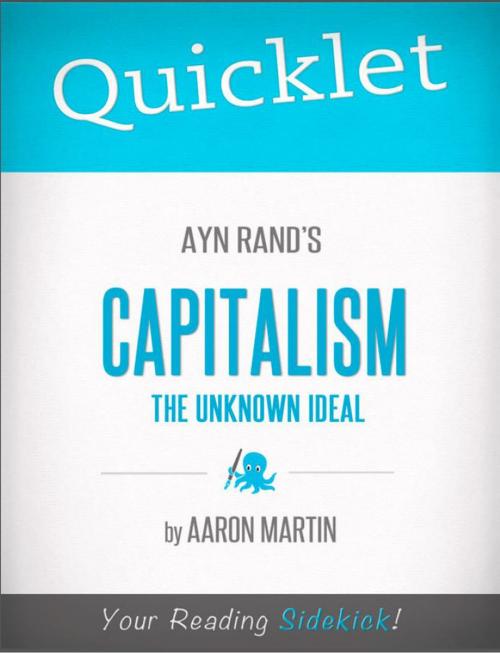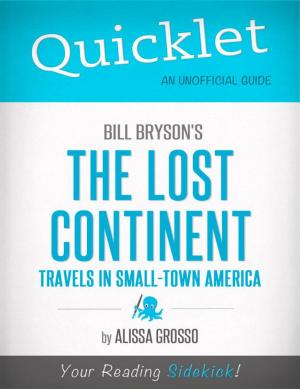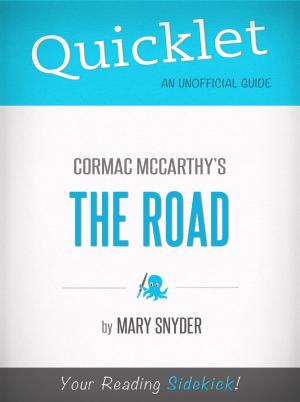Quicklet on Ayn Rand's Capitalism: The Unknown Ideal
Nonfiction, Reference & Language, Study Aids, Book Notes, Art & Architecture, General Art| Author: | Aaron Martin | ISBN: | 9781614642442 |
| Publisher: | Hyperink | Publication: | July 30, 2012 |
| Imprint: | Hyperink | Language: | English |
| Author: | Aaron Martin |
| ISBN: | 9781614642442 |
| Publisher: | Hyperink |
| Publication: | July 30, 2012 |
| Imprint: | Hyperink |
| Language: | English |
ABOUT THE BOOK
As a polemicist, Ayn Rand provokes. As a novelist, she intrigues. As a theorist, she edifies. As a proposer of public policy, she terrifies. When engaging with these multiple faces of Rand, the contradictions can be extreme and the reaction visceral; however, these responses are exactly why so many people continue to buy her books and follow her Objectivist philosophy. When reading Capitalism: The Unknown Ideal, one alternately feels ashamed, invigorated, enlightened, or outraged. But these are the emotional responses which keep readers engaged and eager to continue reading.
Capitalism: The Unknown Ideal, originally published in 1966, collects previously published essays and speeches by Ayn Rand and members of her intellectual circle Alan Greenspan, Nathaniel Branden, and Robert Hessen. This, her third nonfiction work, follows in the wake of For the New Intellectual and The Virtue of Selfishness. Intended to provide the reader with everyday examples of how Objectivism could be practiced, the first half of the book outlines the Objectivist position on issues such as the gold standard, anti-trust law, or the inheritance tax, and acts as a basic primer for the Objectivist philosophy, while the second half of the book contains commentary on the largest political questions of the day including the military draft, the student rebellion and the conflict in Vietnam.
MEET THE AUTHOR
Aaron Martin recently earned his MA in International Relations, and will be beginning his doctoral studies in Political Science starting in August 2012. He is currently in the midst of blogging Tolstoy's War & Peace, but his academic writing has been published in graduate journals and in working paper series. Aaron looks forward to writing about politics and economics for Hyperink, and he hopes you buy his eBooks.
EXCERPT FROM THE BOOK
Capitalism: The Unknown Ideal distinguishes between two competing ideologies: Statism and Capitalism. Although Rand uses her chapters to discuss various points of contention, the difference between her political stance and those that she opposes can always be boiled down to the dichotomy that divides the free, who will live in an ideal capitalistic society, and the enslaved, who toil under the thumb of statist, governmental regimes.
In her work of political economy, Rand draws stark distinction between these two ideologies, one that accepts that the government has a legitimate role in regulating certain markets for goods and services, that is Statism, and the other that sees the states role as being the sole defender of its citizens against unlawful aggression by his fellow man, that is capitalism. She defines statism as, a system of institutionalized violence and perpetual civil war. It leaves men no choice but to fight to seize political power to rob or be robbed, to kill or be killed...it is a system of underground plotting, of secret conspiracies, of deals, favors, betrayals, and of bloody coups (Rand, 36-37).
CHAPTER OUTLINE
Quicklet on Ayn Rand's Capitalism: The Unknown Ideal
+ About the Book
+ About the Author
+ Overall Summary
+ Chapter Reviews
+ ...and much more
Ayn Rand's Capitalism: The Unknown Ideal
ABOUT THE BOOK
As a polemicist, Ayn Rand provokes. As a novelist, she intrigues. As a theorist, she edifies. As a proposer of public policy, she terrifies. When engaging with these multiple faces of Rand, the contradictions can be extreme and the reaction visceral; however, these responses are exactly why so many people continue to buy her books and follow her Objectivist philosophy. When reading Capitalism: The Unknown Ideal, one alternately feels ashamed, invigorated, enlightened, or outraged. But these are the emotional responses which keep readers engaged and eager to continue reading.
Capitalism: The Unknown Ideal, originally published in 1966, collects previously published essays and speeches by Ayn Rand and members of her intellectual circle Alan Greenspan, Nathaniel Branden, and Robert Hessen. This, her third nonfiction work, follows in the wake of For the New Intellectual and The Virtue of Selfishness. Intended to provide the reader with everyday examples of how Objectivism could be practiced, the first half of the book outlines the Objectivist position on issues such as the gold standard, anti-trust law, or the inheritance tax, and acts as a basic primer for the Objectivist philosophy, while the second half of the book contains commentary on the largest political questions of the day including the military draft, the student rebellion and the conflict in Vietnam.
MEET THE AUTHOR
Aaron Martin recently earned his MA in International Relations, and will be beginning his doctoral studies in Political Science starting in August 2012. He is currently in the midst of blogging Tolstoy's War & Peace, but his academic writing has been published in graduate journals and in working paper series. Aaron looks forward to writing about politics and economics for Hyperink, and he hopes you buy his eBooks.
EXCERPT FROM THE BOOK
Capitalism: The Unknown Ideal distinguishes between two competing ideologies: Statism and Capitalism. Although Rand uses her chapters to discuss various points of contention, the difference between her political stance and those that she opposes can always be boiled down to the dichotomy that divides the free, who will live in an ideal capitalistic society, and the enslaved, who toil under the thumb of statist, governmental regimes.
In her work of political economy, Rand draws stark distinction between these two ideologies, one that accepts that the government has a legitimate role in regulating certain markets for goods and services, that is Statism, and the other that sees the states role as being the sole defender of its citizens against unlawful aggression by his fellow man, that is capitalism. She defines statism as, a system of institutionalized violence and perpetual civil war. It leaves men no choice but to fight to seize political power to rob or be robbed, to kill or be killed...it is a system of underground plotting, of secret conspiracies, of deals, favors, betrayals, and of bloody coups (Rand, 36-37).
CHAPTER OUTLINE
Quicklet on Ayn Rand's Capitalism: The Unknown Ideal
+ About the Book
+ About the Author
+ Overall Summary
+ Chapter Reviews
+ ...and much more
Ayn Rand's Capitalism: The Unknown Ideal















